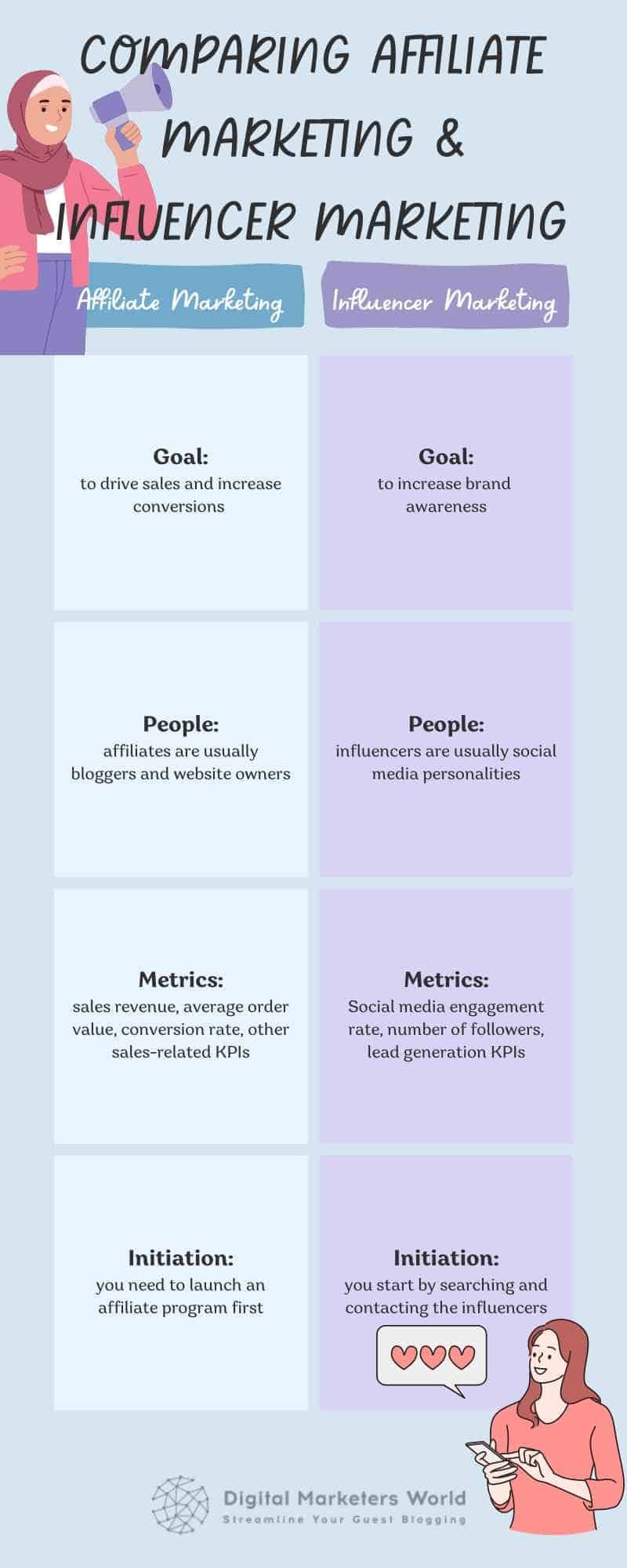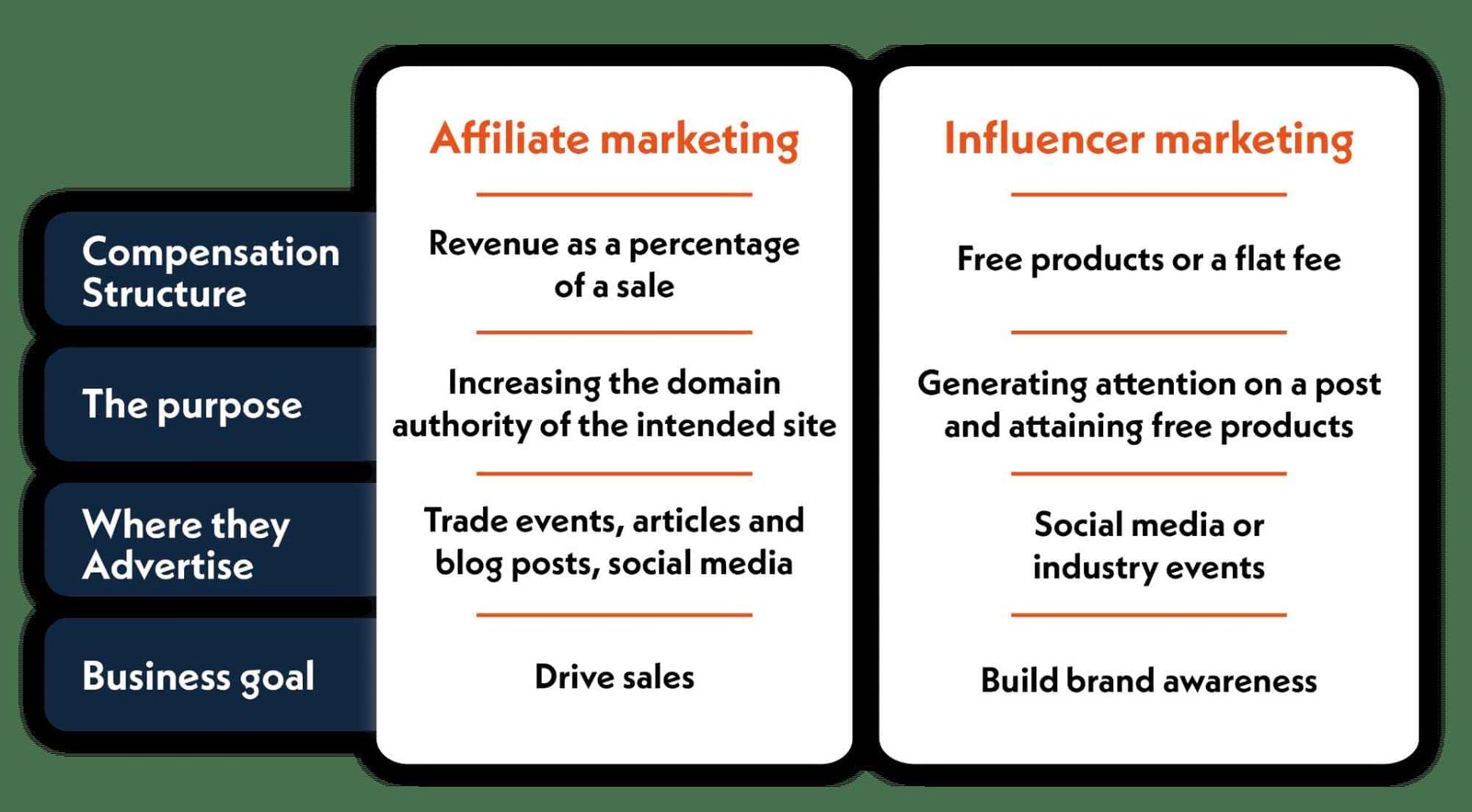Are you tired of spending a fortune on traditional advertising methods? In today’s digital world, businesses are turning to affiliate marketing and influencer marketing as effective strategies to promote their products or services. While both methods have proven to be successful, which one should you opt for? In this comparison article, we’ll dive deep into the differences between affiliate marketing and influencer marketing, weigh their pros and cons, and ultimately answer the all-important question – which strategy works better? As an expert in digital marketing, I have seen both methods up close and personal and can attest to the unique benefits of each. So, buckle up and let’s explore the world of affiliate marketing and influencer marketing to determine the winning strategy.
Affiliate Marketing vs. Influencer Marketing: Which Strategy Works Better?
Overview
| Affiliate Marketing | Influencer Marketing | |
| Definition | A marketing strategy in which an affiliate promotes the products or services of a company in exchange for a commission. | A marketing strategy in which an influencer promotes the products or services of a company through social media or other channels in exchange for compensation or other benefits. |
Key Features
| Affiliate Marketing | Influencer Marketing | |
| Target Audience | Wide range of potential customers based on the affiliate’s promotional efforts. | Targeted audience based on the influencer’s niche or expertise. |
| Cost | Performance-based compensation typically in the form of a percentage of sales. | Compensation varies based on the influencer’s popularity and reach. |
| Control | Advertiser has control over commission rates, creative content, and terms of service. | Influencer has creative control over the content they produce, but must comply with advertiser guidelines. |
| Lead Time | Requires more lead time to build relationships with affiliates and create promotional materials. | Can be executed quickly, but finding the right influencer and negotiating terms may take time. |
| Measurement | Metrics such as clicks, impressions, and conversion rates can be tracked and measured accurately. | Measuring the impact of a campaign can be more difficult due to the influencer’s personal brand and social media algorithm changes. |
Pros and Cons
| Affiliate Marketing | Influencer Marketing | |
| Pros |
|
|
| Cons |
|
|

Affiliate Marketing vs. Influencer Marketing: Which Strategy Works Better?
Short Description
Affiliate marketing and influencer marketing are two popular digital marketing strategies that aim to promote products or services. Affiliate marketing involves promoting a product or service in exchange for a commission for each sale made through your referral link. On the other hand, influencer marketing involves collaborating with social media users who have a large following to promote a product or service.
Pros and Cons
Affiliate Marketing
Pros:
- Low to no startup costs
- Passive income potential
- Easy to scale
- Less risky as the commission is only paid on actual sales
Cons:
- Requires a significant amount of traffic to generate substantial revenue
- Dependent on the product or service’s appeal and demand
- Might not be effective for low-priced products
Influencer Marketing
Pros:
- Targets a specific market or niche
- Creates a personal connection with the audience
- Access to a larger audience and higher reach
- Increased brand awareness
Cons:
- High upfront costs
- Risk of not achieving the desired results
- Dependent on the influencer’s authenticity and credibility
- Loss of control over the message and content
Key Points and Features
Affiliate Marketing
- Commission-based
- Performance-based
- Cost-effective
- Promotes a product or service
- Tracking cookies
- Easy to set up and manage
Influencer Marketing
- Collaboration-based
- Relationship-based
- Brand exposure
- Audience targeting
- Authenticity and style
- Brand ambassadors
Quantitative Measurements and Original Research
According to a study by Mediakix, businesses were expected to spend $13.8 billion on influencer marketing in 2021, while affiliate marketing is projected to reach $8.2 billion by 2022. The same study also showed that 89% of marketers found the ROI from influencer marketing comparable to or better than other marketing channels.
In contrast, affiliate marketing conversion rates vary, ranging from 0.5% to 30%, depending on the industry and the popularity of the product.
Reasons to Consider or Ignore
Consider Affiliate Marketing if:
- You have a platform to promote products or services
- You don’t have a significant budget for advertising
- You have a niche audience
- You’re looking for long-term passive income
Ignore Affiliate Marketing if:
- You don’t have an audience or significant traffic
- You’re promoting low-priced products
- You’re looking for quick sales and instant results
Consider Influencer Marketing if:
- You want to increase brand awareness
- You want to target a specific audience
- You have a sufficient budget for advertising and collaborations
- You’re open to experimenting with different advertising strategies
Ignore Influencer Marketing if:
- You’re on a tight budget
- You’re not willing to give up creative control
- You’re looking for guaranteed sales
Suggestions for Potential Users
Both affiliate marketing and influencer marketing can be effective digital marketing strategies, depending on the business’s goals and budget. If you’re starting from scratch or have a limited budget, affiliate marketing might be a good starting point. However, if you’re looking to increase brand awareness and reach a broader audience, influencer marketing might be a better fit. Regardless, remember to track and analyze the performance of your marketing campaigns to optimize and improve your results.

Guidelines for Using Affiliate Marketing vs. Influencer Marketing: Which Strategy Works Better?
Understanding Their Unique Functionalities
Using affiliate marketing and influencer marketing effectively requires understanding the unique functionalities of each strategy. While affiliate marketing focuses on promoting a product through an affiliate link and earning commission for each sale made, influencer marketing centers on leveraging the influence and reach of an individual to promote a product to their followers.
Choosing a Strategy That Alings With Your Goals
Before selecting a marketing strategy, it is essential to evaluate your business objectives. If your goal is to increase brand recognition and establish credibility in your niche, influencer marketing may be the best fit. However, if you aim to drive more sales and conversions, affiliate marketing is an effective strategy.
Selecting the Right Affiliate or Influencer
Choosing appropriate affiliates or influencers plays a crucial role in the success of your marketing campaign. Select individuals or brands whose audiences align with your target market, share the same values, and have a loyal following. Consider their engagement rate as well, which indicates how well their content resonates with their followers.
How To Choose Between Affiliate Marketing and Influencer Marketing for Your Business
Here are five questions to ask yourself and step-by-step instructions to help you decide which marketing strategy works better for your business.
1. How To Determine Your Marketing Goals?
Step-by-step instructions:
- Identify what you want to achieve with your marketing strategy.
- Write down specific, measurable, attainable, relevant and time-bound goals.
- Assess which marketing strategy best aligns with your goals.
- If you want to drive sales and increase traffic, then affiliate marketing may be a better choice.
- If you want to build brand awareness and reach a wider audience, then influencer marketing may be a better option.
2. How To Identify Your Target Audience?
Step-by-step instructions:
- Understand your business’s ideal customer profile.
- Research your target audience’s interests, preferences and behavior.
- Explore which marketing strategy resonates with your target audience the most.
- Consider whether affinity, engagement or exposure are more impactful for your target audience and brand.
3. How To Calculate the Budget and ROI of Your Marketing Campaign?
Step-by-step instructions:
- Determine the budget you can allocate to your marketing efforts.
- Estimate the potential ROI of each marketing strategy.
- Assess which strategy has the lowest Cost Per Acquisition (CPA).
- Consider the price of resources such as affiliate networks or agency fees, as well as the commission that affiliates or influencers charge, when calculating ROI.
4. How To Measure the Success of Your Marketing Efforts?
Step-by-step instructions:
- Establish which Key Performance Indicators (KPIs) you want to track.
- Track KPIs such as clicks, conversions, sales and traffic.
- Compare the KPIs of each marketing strategy to determine which performs better.
- Keep in mind that each KPI measures different aspects of success. For example, while affiliate marketing may generate more sales, influencer marketing may attract more traffic.
5. How To Optimize Your Marketing Efforts Over Time?
Step-by-step instructions:
- Regularly review your marketing performance and adjust your strategy accordingly.
- Experiment with different affiliate or influencer partners to see which ones perform the best.
- Continuously analyze your target audience, KPIs and budget to determine which marketing strategy is most effective for your business.
- Stay up-to-date with industry trends and adapt your marketing strategy accordingly.
Frequently Asked Questions
1. What is Affiliate Marketing?
Answer: Affiliate Marketing is a type of marketing strategy in which a company partners with a website or an individual, who promotes the company’s product or service in exchange for a commission on sales generated through their promotion.
2. What is Influencer Marketing?
Answer: Influencer Marketing is a type of marketing strategy in which a company partners with a social media influencer, who has a large follower base. The influencer promotes the company’s product or service to their followers in exchange for compensation.
3. Which strategy is more effective in driving sales?
Answer: It depends on the type of product or service and the target audience. Affiliate marketing is ideal for products or services that require a detailed explanation or comparison. Influencer marketing, on the other hand, is ideal for products or services that require a visual demonstration or targeting a specific niche audience.
4. Which strategy is more cost-effective?
Answer: Affiliate Marketing is generally considered more cost-effective as the company only pays a commission to the affiliate marketer when a sale is made. In contrast, influencer marketing involves upfront payments to the influencer, regardless of actual sales.
5. Can we use both Affiliate Marketing and Influencer Marketing?
Answer: Yes, it is possible to use both Affiliate Marketing and Influencer Marketing as part of a comprehensive marketing strategy. Companies can partner with relevant affiliates and influencers to drive maximum sales and brand awareness.
In conclusion, both affiliate marketing and influencer marketing have their own unique advantages and disadvantages. Affiliate marketing is more structured and offers reliable metrics, while influencer marketing allows for more authentic and engaging content. Ultimately, the choice between the two strategies depends on the specific goals and needs of the business.
For those looking for a cost-effective and measurable approach, affiliate marketing may be the way to go. But for those wanting to build brand awareness and create a loyal following, influencer marketing can be an effective strategy.
Overall, the key to success in either strategy is to carefully select the right affiliates or influencers, build strong relationships with them, and provide them with the necessary resources to create high-quality content. By doing so, businesses can leverage the power of both affiliate and influencer marketing to drive sales, increase brand visibility, and grow their customer base.